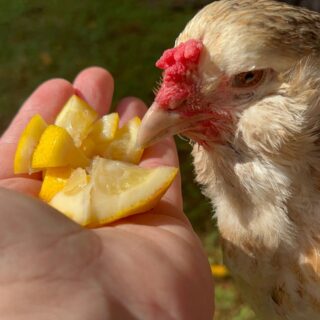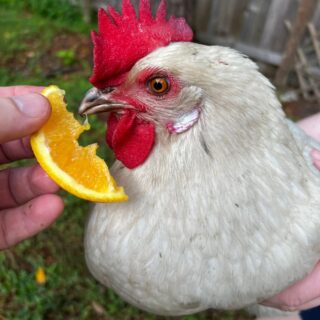Yes, chickens can eat peaches as long as they are fresh and have the pits removed. Peaches provide chickens with essential vitamins like A, C and E. Plus they love the sweet flavor.
To make sure you know all the benefits, how to feed them and what to skip keep on reading.

Jump to:
Are Peaches Safe For Chickens?
For the most part, yes it is safe for chickens to eat peaches. The yellow flesh on the inside of the peach, what we think of as the actual peach, is absolutely a safe and tasty treat. Additionally, you do not have to remove the skin before feeding peaches to your chickens.
Just like when feeding chickens nectarines, feeding chickens mangos, and feeding chickens papayas (or any other treats for that matter) you do want to make sure you don't overfeed them.
Too much of any treats can be unhealthy.
Can chickens eat peach skins?
Yes, chickens can eat peach skins. It will contain many nutrients that the chicken can use and can help keep your chickens healthy. They may waste some of it but they will probably eat a good amount of the skin while eating the fruit.
Need some help keeping your chickens health and care taken care of? Check out the Organized Chicken Keeper for an easy to follow system.
Can chickens eat peach pits?
No, chickens should not eat peach pits, or stone, as it's sometimes called. The pit is the large, hard seed found in the center of a peach.
Just like when considering if chickens can eat apples, peaches contain amygdalin which changes into hydrogen cyanide. Cyanide in peach pits are, just like in apple seeds, toxic and can cause your chicken to become sick and even die.
Fortunately, this will likely never be a real problem because the pits are generally much too hard and large for a chicken to waste time bothering with it; especially when there's a sweet and juicy peach close by.
Can chickens eat whole peaches?
No, chickens cannot eat whole peaches because they cannot have the peach pits as mentioned above. However, if you slice the peach in half and remove the pit, they can have peach halves.
Are the leaves and peach tree poisonous to chickens?
Just like the pit, the leaves of a peach tree also contain amygdalin. So the same risk of cyanide poisoning is present in the leaves. Stick to giving your chickens a juicy peach free of pits and greens.
Can chickens eat canned peaches?
Technically yes, chickens can eat canned peaches but it isn't really a great idea. Canned peaches contain a ton of sugar which can be harmful for chickens, which we will discuss a little more in depth later.
If you canned your own peaches with little to no sugar, or purchased no sugar added canned peaches those might be ok to feed your chickens.

How to Feed Peaches to Chickens
- Make sure it is fresh and not moldy.
- Wash it well.
- Cut the peach open and remove the pit.
- Feed as half the peach or cut it into pieces.
- Toss it out to your chickens.
In our experience, chickens love them - they are sweet and colorful so they run right over to them. Then, once they get a taste, they quickly eat them all.
Another fun option, like we did with kiwi (chickens can eat kiwi, too), is to suspend a peach at the chickens' eye level. They will, not only have a tasty treat but a fun DIY chicken toy to keep them busy and less bored.
Benefits of Feeding Peaches
They are high in things like Vitamin C, Vitamin A, and antioxidants. Here are a few of the main vitamins and how they help your chickens:
- Antioxidants: repair damage from free radicals, cellular repair and reducing oxidative stress just to name a few things.
- Vitamin A: support during stress, immune system, eyes and skin.
- Vitamin C: cellular and immune health as well as overall egg laying. Chickens can eat lemons to get even more vitamin c.
- Calcium: helps keeps bones and egg shells strong.
- Fiber: helps with nutrient absorption and overall GI health. Chickens can eat strawberries for even more fiber.
- Folate (B Vitamin): folate deficiency; helps blood formation; healthy feathers & size
- Potassium: temperature control; hydration & electrolyte regulation, and metabolism. This is also found in figs that chickens can eat.
The table below, courtesy of the USDA FoodData Center, has a breakdown of the nutritional analysis based on a serving size of 1 medium sized fresh peach (147 g).
| Name | Amount | Measurement |
|---|---|---|
| Water | 130 | g |
| Energy | 67.6 | kcal |
| Protein | 1.34 | g |
| Carbohydrates | 14.8 | g |
| Fiber | 2.2 | g |
| Fat | .397 | g |
| Sugars | 12.3 | g |
| Calcium | 5.88 | mg |
| Potassium | 179 | mg |
| Folate | 8.82 | µg |
| Vitamin C | 6.03 | mg |
| Vitamin A | 35.3 | µg |
Feeding Chickens Peaches FAQs
Yes, you can give them too much. Like we said earlier, only feed your chickens peaches in moderation. We like to stick with the 90/10 rule meaning no more than 10% of your chickens' diet should be anything outside of their feed and what they can forage.
No, chickens cannot eat rotten or spoiled peaches. Never feed rotten or moldy fruit (or any food, for that matter) to your chickens.
If you need more help with taking care of your chickens, check out The Organized Chicken Keeper for a complete system for managing their health through keeping their supplies stocked and coop clean.




